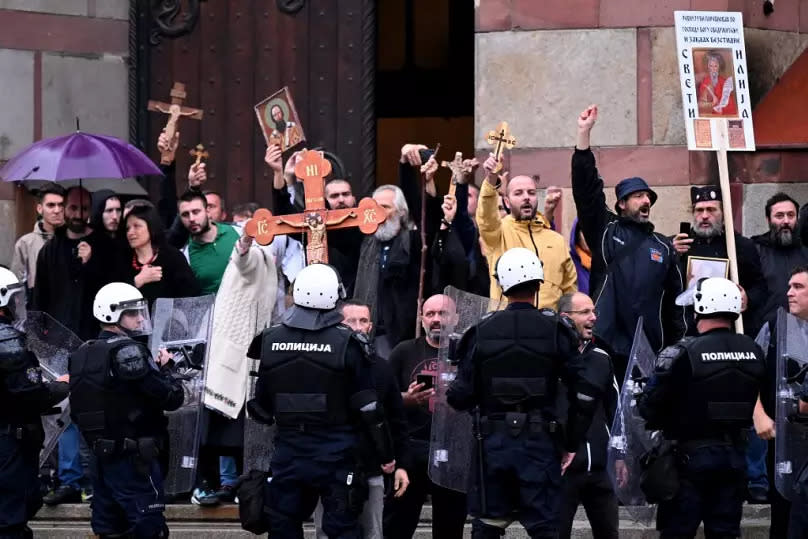'Truly historic': Thousands march for Serbia EuroPride after 11th-hour announcement
Thousands of people took part in Serbia EuroPride on Saturday, after an 11th-hour announcement by the country's PM that the march could go ahead, despite a previous ban.
Serbian Prime Minister Ana Brnabic said that the 2022 EuroPride March, scheduled for 17:00 local time, could take place Saturday morning, following weeks of controversy.
Brnabic vowed that the pan-European LGBT+ event would be protected by police, who were deployed in the Serbian capital, Belgrade, where the march took place.
The run-up to Serbia EuroPride was marred by tensions amid threats from far-right and anti-gay groups, and an earlier ban by the Serbian Interior Minister, who forbid the march on Tuesday over alleged "security concerns."
The parade happened without any major incidents.
Several small clashes were reported on Saturday with anti-pride protestors throwing projectiles at police who were protecting the march. Authorities said 64 people were arrested on Saturday.

Responding to the news that the march could take place, Kristine Garina, President of the European Pride Organisers Association, said she was "overjoyed" that Brnabic had "kept the promise she made in 2019 to support EuroPride in Belgrade."
"EuroPride is a celebration of love, a movement for equality, and part of a global campaign for human rights," she continued. "It embodies European values and is a threat to no one and certainly not to Serbia."
Garina said the test of the PM's statement would be a "successful and safe" march.
“This will truly be a historic EuroPride, and the most important in our 30-year history," she added.
Today's event is the first EuroPride to happen outside the European Economic Area.
Dozens of diplomats, Members of the European Parliament, European and international leaders will join the thousands of activists as they walk from the National Assembly in Belgrade.
On Friday, Serbia's Ministry of Internal Affairs upheld its earlier decision to bar the EuroPride march from taking place, despite attempts by organisers to seek a "compromise" with the authorities.
"Due to a number of lies, schemes and attempts to humiliate the Republic of Serbia, its legal system and its institutions, I'd like to inform the citizens of Serbia that no one, and the Ministry of Internal Affairs especially, succumbed to the pressures of the great powers of the West," Internal Affairs Minister Aleksandar Vulin said on Friday.
"As previously stated, the ban on the march organised by EuroPride 2022 remains in effect," he said.
EuroPride organisers proposed a new route for their march in Belgrade, after Serbia barred the LGBTQ+ rights demonstration earlier this week, stating security concerns.
The proposed change shortened the original route, a move the organisers have called a major compromise.
"We tried on our part to do something. There is a red line, which is that it is impossible not to have a parade. That is very important,” said Goran Miletić, a coordinator of EuroPride.
“We discussed with the authorities the various options that exist, but no agreement could be reached."
Organisers have also collected close to 30,000 signatures for a petition calling for the government to lift the ban.
"Over 29,000 people from 123 countries around the world have shown their solidarity with the LGBTQ+ community here in Belgrade, by signing the petition that we handed in just now," said Matthew Beard, executive director of All Out.
Serbia’s police originally claimed potential clashes with far-right and religious counterprotests on Saturday -- which were also banned -- were the reason behind the decision.
Since late August, conservative groups have been demonstrating against the LGBTQ+ community, EuroPride events and Saturday's march.
And while Serbia has made gains for the LGBTQ+ community since a Pride march in 2001 that turned violent -- with annual parades taking place in Belgrade since 2014 -- anti-LGBTQ+ sentiment is still prevalent.
Although Serbian law prohibits discrimination against LGBTQ+ people, the country has yet to legalise same-sex marriage or allow equal parenting rights for same-sex couples.
Despite the ban on the EuroPride march, organisers are still planning to hold the event on Saturday. "If it's banned, we will walk nevertheless," Miletić said.
The Council of Europe, the continent's top human rights body, and MEPs in Brussels have called on Serbian authorities to allow the march to go ahead.

 Yahoo News
Yahoo News 


